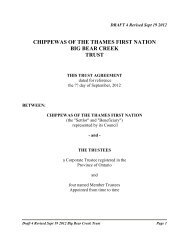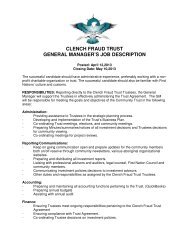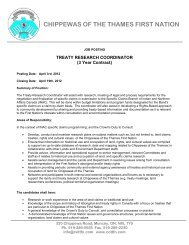CHIPPEWAS OF THE THAMES COMMUNITY STORY - Cottfn
CHIPPEWAS OF THE THAMES COMMUNITY STORY - Cottfn
CHIPPEWAS OF THE THAMES COMMUNITY STORY - Cottfn
Create successful ePaper yourself
Turn your PDF publications into a flip-book with our unique Google optimized e-Paper software.
elative safety and security of the community and travel off Reserve to attend High<br />
School. In that world, they suddenly find themselves to be ―outsiders‖ subjected to<br />
racism and many kinds of unhealthy peer pressure, as well as academically<br />
disadvantaged (often several grade levels behind in core subjects). Acute feeling of<br />
inadequacy and shame are reported by some youth, and many are not even able to<br />
successfully make this transition, so they drop out.<br />
Another very difficult period for many COTT young people occurs when they leave<br />
school (whether they have graduated or not). If they are not continuing in some post-<br />
secondary programs, many end up unemployed, on welfare and without real aim or<br />
direction in their lives. This age group often becomes immersed in an extended<br />
adolescent lifestyle involving alcohol and drug use, partying, unprotected sex and<br />
irresponsible and sometimes dangerous behaviour patterns. Many babies are born from<br />
parents of this age group, who are really not ready or even willing to act as parents. The<br />
insights and observations of Community Story participants shed light on these<br />
challenges and suggest pathways for change.<br />
1. What is life like now for youth?<br />
Home Life<br />
a. Many of the youth of Chippewas of the Thames have grown up and are still living in<br />
homes in which poverty, alcohol and drug abuse, and intergenerational trauma and<br />
abuse colours every aspect of life.<br />
b. Poverty affects many things in terms of youth well-being. It affects access to<br />
transportation and therefore to recreation and a positive social life, involvements in<br />
extra-circular activities in school, as well as the ability youth have to maintain healthy<br />
peer relations. Poverty also contributes to the expectations families communicate to<br />
young people about for what a person can or should even try to achieve in life. In<br />
other words, the culture of poverty becomes the only reality a young person grows up<br />
knowing, and contributes to the development of thinking and life long habits that may<br />
well lead a young person into the being the next generation of families living in<br />
poverty.<br />
c. Low levels of family wellness (i.e. addictions, dysfunctional thinking, low levels of<br />
family support for their children, violence, abuse, the prevalence of chronic<br />
depression or anger), and a family culture of dependency and learned helplessness<br />
Chippewas of the Thames Community Story<br />
October 2011<br />
13








